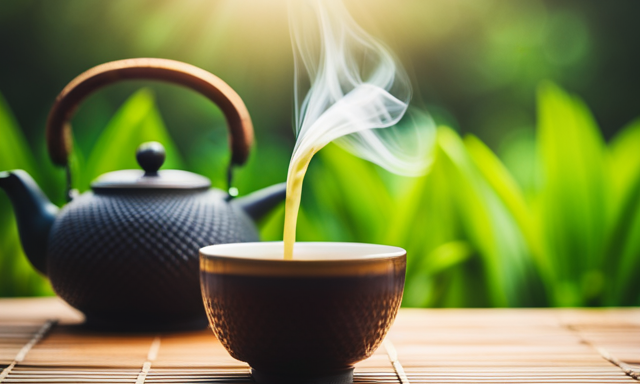Have you ever wondered if there is a natural and effective way to shed those extra pounds? Well, I have some good news for you! Oolong tea might just be the answer you’ve been looking for.
As someone who has struggled with weight loss in the past, I understand the frustrations and challenges that come with it. That’s why I’m excited to share with you the incredible benefits of oolong tea when it comes to losing weight.
In this article, we will explore the composition of oolong tea and how it can boost your metabolism, manage blood sugar levels, suppress your appetite, enhance digestion, increase energy levels, and combat inflammation.
We will also discuss how to incorporate oolong tea into your weight loss routine and any potential side effects or precautions to consider.
So, let’s dive in and discover how oolong tea can help you achieve your weight loss goals naturally and effectively.
Key Takeaways
- Oolong tea enhances fat utilization during exercise and promotes fat oxidation, making it a powerful tool for weight loss.
- The antioxidants in oolong tea, such as catechins, theaflavins, and flavonoids, help combat inflammation and oxidative stress, supporting weight loss efforts.
- Oolong tea can help control blood sugar levels, reduce cravings, and reduce abdominal fat, making it beneficial for weight loss and overall health.
- It is important to consume oolong tea in moderation, be mindful of caffeine sensitivity, and consider interactions with medications or health conditions when using it for weight loss. Consulting with a healthcare professional is recommended, especially for individuals with heart problems or anxiety disorders.
Understanding the Composition of Oolong Tea
So, what exactly is in oolong tea that makes it a potential weight loss aid? Well, oolong tea is known for its unique composition, which includes polyphenols, catechins, and caffeine. These compounds work together to provide various health benefits, including boosting metabolism and managing blood sugar levels.
Polyphenols, specifically, have been found to increase fat oxidation and promote weight loss. They also have antioxidant properties that help protect the body against damage caused by free radicals.
Catechins, on the other hand, have been shown to enhance fat metabolism and reduce body weight.
Additionally, the caffeine content in oolong tea can increase energy expenditure and fat oxidation, further contributing to weight loss.
With all these components combined, oolong tea can be a valuable tool in your weight loss journey.
Now, let’s delve deeper into how oolong tea can boost metabolism.
Boosting Metabolism with Oolong Tea
Improve your chances of shedding pounds by enhancing your metabolism with the exceptional powers of oolong tea. Oolong tea contains compounds that have been shown to boost metabolism and increase fat oxidation, helping you burn calories more efficiently. One study found that drinking oolong tea increased energy expenditure by 2.9% and fat oxidation by 12%. Another study showed that oolong tea increased metabolism by 10% for up to two hours after consumption. These findings suggest that incorporating oolong tea into your daily routine may help you achieve your weight loss goals. Additionally, oolong tea has been found to help manage blood sugar levels by improving insulin sensitivity and reducing blood glucose levels. This can be beneficial for weight management and preventing type 2 diabetes. Moving on to managing blood sugar levels, it is important to understand the impact of oolong tea in this aspect.
Managing Blood Sugar Levels
To effectively manage blood sugar levels, consider incorporating oolong tea into your daily routine as it’s suggested to improve insulin sensitivity and reduce blood glucose levels, potentially aiding in weight management and preventing type 2 diabetes.
Oolong tea contains polyphenols, which are antioxidants that have a positive effect on blood sugar management. Studies have shown that the polyphenols in oolong tea can help regulate blood sugar levels by inhibiting the enzyme responsible for breaking down carbohydrates. This means that oolong tea may help slow down the absorption of sugar into the bloodstream, preventing spikes in blood sugar levels.
Additionally, oolong tea may also help improve insulin sensitivity, allowing the body to use insulin more effectively to control blood sugar. By incorporating oolong tea into your daily routine, you may be able to better manage your blood sugar levels and support your weight loss goals.
Now, let’s move on to how oolong tea can help suppress appetite and cravings.
Suppressing Appetite and Cravings
When it comes to managing my weight and controlling my appetite, I’ve found that oolong tea has been incredibly helpful. One key point is that oolong tea has been shown to affect satiety hormones, such as ghrelin and leptin. This can help increase feelings of fullness and reduce hunger.
Additionally, oolong tea has been found to reduce food cravings and emotional eating, which can often derail my weight loss efforts. Studies have shown that regularly consuming oolong tea can have a positive impact on appetite control and ultimately support weight management.
Effect of oolong tea on satiety hormones
By incorporating oolong tea into your daily routine, you’ll notice how it enhances the release of satiety hormones, helping you feel more satisfied and in control of your food cravings.
Oolong tea has been found to have a positive effect on hunger regulation. It increases the secretion of peptide YY (PYY) and cholecystokinin (CCK), which are hormones responsible for promoting feelings of fullness and reducing appetite. Additionally, oolong tea has been shown to decrease the levels of ghrelin, a hormone that stimulates hunger. This dual action of oolong tea on satiety hormones can help regulate food intake and prevent overeating.
Furthermore, oolong tea has been found to reduce the activity of the enzyme amylase, which is involved in the breakdown of carbohydrates. This can lead to a slower release of glucose into the bloodstream, preventing rapid spikes in blood sugar levels and subsequent cravings for sugary foods.
Incorporating oolong tea into your daily routine can be an effective strategy to reduce food cravings and emotional eating.
Reduction of food cravings and emotional eating
After examining the effect of oolong tea on satiety hormones, it’s worth exploring how it can assist in weight loss by reducing food cravings and emotional eating.
Oolong tea contains polyphenols that have been shown to regulate the release of serotonin, a neurotransmitter that plays a crucial role in mood and appetite control. By increasing serotonin levels, oolong tea can help curb emotional eating, preventing individuals from turning to food for comfort.
Additionally, the polyphenols in oolong tea have been found to reduce the cravings for high-calorie and sugary foods. This can further aid in weight loss by promoting healthier food choices.
By reducing emotional eating and controlling food cravings, oolong tea can be an effective tool in achieving weight loss goals.
With these benefits in mind, let’s now delve into how oolong tea enhances digestion and gut health.
Enhancing Digestion and Gut Health
Improve your gut health and digestion with oolong tea – because who needs a well-functioning digestive system anyway? Oolong tea has been shown to have positive effects on gut microbiota, the collection of microorganisms in our digestive tract that play a crucial role in maintaining overall health.
The tea contains polyphenols, which are known to promote the growth of beneficial bacteria in the gut, ultimately improving digestion and nutrient absorption. Additionally, oolong tea has been found to stimulate the production of digestive enzymes, which are responsible for breaking down food and aiding in the absorption of nutrients.
By enhancing both gut microbiota and digestive enzymes, oolong tea supports a healthy digestive system, helping you feel better overall.
So, let’s move on to the next section, where we explore how oolong tea can increase energy levels and physical performance.
Increasing Energy Levels and Physical Performance
When it comes to increasing energy levels and physical performance, oolong tea has been shown to have some promising effects. Personally, I’ve found that drinking oolong tea before a workout helps boost my endurance and stamina. It allows me to push myself further during exercise. Additionally, research suggests that oolong tea may enhance fat utilization during exercise. This could potentially aid in weight loss and improve overall physical performance.
Boosting endurance and stamina
Oolong tea can enhance your endurance and stamina, helping you power through any physical challenge with ease. Research suggests that oolong tea may have positive effects on cardiovascular health and respiratory function, which can contribute to improved endurance during exercise.
A study published in the Journal of Alternative and Complementary Medicine found that regular oolong tea consumption improved cardiovascular function and increased exercise performance in healthy individuals. Additionally, oolong tea contains caffeine, which can stimulate the central nervous system and increase alertness, ultimately boosting stamina.
These findings indicate that incorporating oolong tea into your daily routine may provide you with the extra energy and endurance needed to push through intense workouts or physical activities.
Moving forward, let’s explore the effect of oolong tea on fat utilization during exercise.
Effect of oolong tea on fat utilization during exercise
Boosting endurance and stamina with oolong tea is just the beginning of its weight loss benefits. Another way oolong tea aids in weight loss is by enhancing fat utilization during exercise. Studies have shown that oolong tea increases fat oxidation, which is the process of breaking down stored fat for energy. This means that during physical activity, oolong tea helps your body burn more fat, leading to greater weight loss. Additionally, oolong tea has been found to improve exercise performance by increasing endurance and reducing fatigue. This combination of increased fat utilization and improved exercise performance makes oolong tea a powerful tool for weight loss. Transitioning into the next section about combating inflammation and oxidative stress, oolong tea’s benefits extend beyond weight loss.
Combating Inflammation and Oxidative Stress
Oolong tea has been found to have antioxidant properties, which can help combat inflammation and oxidative stress in the body. Research has shown that oolong tea can reduce inflammation markers, such as C-reactive protein and interleukin-6.
These findings suggest that incorporating oolong tea into your diet may be beneficial in reducing inflammation and promoting overall health.
Antioxidant properties of oolong tea
Indulging in a cup of this delightful brew can provide you with a range of antioxidants that support your weight loss journey. Oolong tea is packed with powerful antioxidants like catechins, theaflavins, and flavonoids, which have been shown to have numerous health benefits.
These antioxidants help to combat oxidative stress and reduce inflammation in the body, which can contribute to weight gain. To enjoy what’s written, here are four reasons why oolong tea’s antioxidant properties can aid in weight loss:
- Oolong tea helps boost metabolism, aiding in calorie burning.
- It promotes fat oxidation, helping to break down stored fat.
- Oolong tea can help control blood sugar levels, reducing cravings for sugary snacks.
- It assists in reducing abdominal fat, which is associated with an increased risk of obesity-related health issues.
By incorporating oolong tea into your daily routine, you can take advantage of its antioxidant benefits and support your weight loss goals.
Moving forward, let’s explore how oolong tea also helps in the reduction of inflammation markers.
Reduction of inflammation markers
Are you ready to discover the surprising way that oolong tea can transform your body and improve your overall health?
One of the key benefits of oolong tea is its ability to reduce inflammation, which plays a significant role in weight loss. Inflammation is a natural response by the body to protect against infections and injuries. However, chronic inflammation can lead to weight gain and various health issues.
Oolong tea contains powerful antioxidants called polyphenols, which have been found to reduce inflammation markers in the body. By incorporating oolong tea into your daily routine, you can help combat inflammation and improve your overall health.
So, let’s explore how you can easily incorporate oolong tea into your weight loss routine for maximum benefits.
Incorporating Oolong Tea into Your Weight Loss Routine
To maximize the benefits of oolong tea for weight loss, it’s essential to find creative and enjoyable ways to include this powerful beverage in your daily routine. One way to incorporate oolong tea into your weight loss routine is by using it during intermittent fasting. Oolong tea is calorie-free and can be consumed during fasting periods, helping to curb hunger and keep you hydrated.
Another option is to include oolong tea in a ketogenic diet. This tea contains polyphenols that’ve been shown to increase fat oxidation and boost metabolism, making it a great addition to a low-carb, high-fat diet. By incorporating oolong tea into these eating plans, you can enhance their weight loss effects.
Transitioning to the next section about potential side effects and precautions, it’s important to be aware of any possible drawbacks to using oolong tea for weight loss.
Potential Side Effects and Precautions
When it comes to incorporating oolong tea into my weight loss routine, I’m mindful of potential side effects and precautions.
Firstly, I pay attention to my caffeine sensitivity and consume oolong tea in moderation to avoid any negative effects like jitters or sleep disturbances.
Additionally, I’m cautious about any potential interactions with medications or health conditions I may have, as oolong tea could affect their efficacy or worsen certain conditions.
Caffeine sensitivity and moderation
If you’re someone who can’t resist a second cup of oolong tea, the caffeine content can be a double-edged sword, providing an energy boost while also prompting you to moderate your intake.
-
Caffeine sensitivity: Some individuals may be more sensitive to the effects of caffeine, experiencing symptoms like jitteriness, rapid heartbeat, or difficulty sleeping. It’s important to listen to your body and adjust your oolong tea consumption accordingly.
-
Weight loss plateau: While oolong tea can aid in weight loss by boosting metabolism and fat oxidation, excessive caffeine intake may lead to a weight loss plateau. This occurs when your body becomes tolerant to the effects of caffeine, reducing its weight loss benefits. Moderating your oolong tea consumption can help prevent this plateau and maintain steady progress.
Considering these factors, it’s crucial to be mindful of your caffeine intake and ensure it aligns with your individual needs and tolerance. Transitioning into the next section about interactions with medications and health conditions, it’s important to be aware of how oolong tea may interact with certain medications or health conditions.
Interactions with medications and health conditions
As I mentioned before, caffeine sensitivity and moderation are important factors to consider when consuming oolong tea for weight loss. However, it’s also crucial to be aware of potential interactions with medications and health conditions.
Oolong tea contains compounds that may interact with certain medications, such as blood thinners and medications for high blood pressure or diabetes. It’s always best to consult with a healthcare professional before incorporating oolong tea into your weight loss journey if you’re taking any medications.
Additionally, individuals with certain health conditions, such as heart problems or anxiety disorders, may need to limit their consumption of oolong tea or avoid it altogether.
Understanding these interactions and considering your individual health status is essential for safe and effective weight loss with oolong tea.
Frequently Asked Questions
Can oolong tea be consumed by pregnant women?
Pregnant women should consult with their healthcare provider before consuming oolong tea. While oolong tea has potential health benefits, it may also contain caffeine and other compounds that could be harmful during pregnancy.
Does oolong tea have caffeine?
Yes, oolong tea does contain caffeine. However, the caffeine content in oolong tea is generally lower than that in coffee or black tea. It is important to be mindful of potential side effects and benefits of oolong tea when consuming it.
How much oolong tea should I drink daily to see weight loss effects?
To see weight loss effects, I should drink 2-3 cups of oolong tea daily. Oolong tea benefits weight loss through its metabolism-boosting properties and ability to control blood sugar levels.
Can oolong tea interact with certain medications?
Oolong tea can potentially interact with certain medications, leading to unwanted side effects. It is important to consult with a healthcare professional before consuming oolong tea if you are taking any medications.
Is it safe to drink oolong tea in combination with other weight loss supplements?
Combining oolong tea with weight loss supplements can have potential side effects. For example, a case study reported increased heart rate and jitteriness. It’s important to consider these risks before combining them.
Conclusion
In conclusion, oolong tea has shown promising effects in aiding weight loss. It’s unique composition of antioxidants, catechins, and caffeine can boost metabolism, manage blood sugar levels, suppress appetite, and enhance digestion. Additionally, oolong tea can increase energy levels and physical performance, combat inflammation, and oxidative stress. However, it’s important to note that oolong tea isn’t a magical solution and should be incorporated into a healthy weight loss routine. It’s always advisable to consult with a healthcare professional before making any significant changes to your diet or lifestyle.










